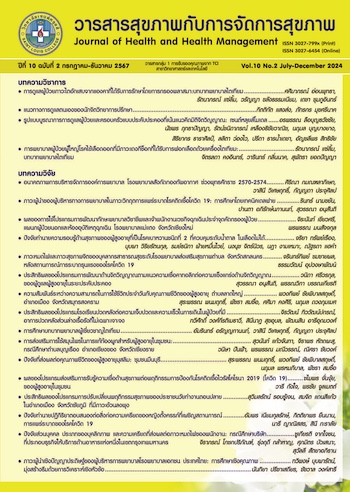Leadership of Nursing Administrators in the Crisis of COVID-19: Delphi Technique
Keywords:
Leadership of nursing administrators, COVID-19 crisis, Delphi techniqueAbstract
This qualitative research used the Delphi technique. The purpose of the study is leadership styles and leadership characteristics of nursing administrators during the COVID-19 crisis situation. The samples were 21 experts who is administrator or manager on the pandemic COVID-19. Samples were selected by purposive sampling which consisted of 3 doctors providing care for COVID-19 patients, 2 heads of nursing in government hospitals, 3 nursing managers in private hospitals, 7 supervisors and head wards of government hospitals, and 6 supervisors and head wards of private hospitals. The research instruments consisted of a semi-structured interview form and a 5-level rating scales questionnaire on leadership styles and leadership characteristics of nursing administrators. Data were analyzed by content analysis method, median, and interquartile The research results found that: 1. Leadership styles of nursing administrators during the COVID-19 crisis consists of leadership according to the situation, including: 1) 7 items of directive leadership 2) 6 items of leadership selling ideas 3) 6 items of participatory leadership and 4) 7 items of distributed leadership and 6 items of transformational leadership. 2. Leadership characteristics of nursing administrators during the COVID-19 crisis consists of 4 areas: 1) 10 items of self-leadership 2) 9 items of thinking process leadership 3) 10 items of leadership in relationships with others, and 4) 7 items of digital leadership.
References
กชกร เนียมท่าเหลา, และสมชาย เทพแสง. (2566). ภาวะผู้นำการเปลี่ยนแปลงในศตวรรษที่ 21. วารสารบริหารการศึกษา มศว, 20(38), 39-50.
ไชยะ เทพา. (2564). ภาวะผู้นำทางการเมืองในยุคโควิด 19. วารสารวิทยาการมนุษยศาสตร์และสังคมศาสตร์, 4(3), 1027-1044.
ทศพร ศรีสัมพันธ์ (2553) เทคนิควิธีการวิเคราะห์นโยบาย. หน้า 74-86. (พิมพ์ครั้งที่ 9). กรุงเทพฯ: สำนักพิมพ์แห่งจุฬาลงกรณ์มหาวิทยาลัย.
นํ้าผึ้ง มีศิล. (2559). การวิจัยด้วยเทคนิคเดลฟาย : การหลีกเลี่ยงมโนทัศน์ที่ไม่ถูกต้อง. วารสารวิชาการ Veridian E-Journal, Silpakorn University, 9(1), 1256-1267.
บุญใจ ศรีสถิตนรากูร. (2553). ระเบียบวิธีการวิจัยทางพยาบาลศาสตร์. (พิมพ์ครั้งที่ 5). กรุงเทพ: ยูแอนด์ไอ อินเตอร์ มีเดีย จำกัด.
บุษริน สว่างเพชร, ฉัตรสุมน พฤฒิภิญโญ, และวันวิสาข์ ศรีสุเมธชัย. (2566). ภาวะผู้นำกับผลการปฏิบัติงานของพยาบาลในโรงพยาบาลระดับตติยภูมิแห่งหนึ่ง ในจังหวัดนนทบุรี ระหว่างการระบาด ของโรคติดเชื้อไวรัสโคโรนา 2019. วารสารกฎหมายและนโยบายสาธารณสุข, 9(3), 388-400.
เพ็ญศิริ อัตถาวงศ์, และประณีต ส่งวัฒนา. (2566). การถอดบทเรียนความสำเร็จของพยาบาลผู้นำในการบริหารจัดกาบริการฉีดวัคซีนโควิด 19 แบบเบ็ดเสร็จ: กรณีศึกษาศูนย์ฉีดวัคซีนสงขลา. วารสารมหาวิทยาลัยนราธิวาสราชนครินทร์, 15(1), 234-249.
ระนอง เกตุดาว, อัมพร เที่ยงตรงดี, และภาสินี โทอินทร์. (2563). การพัฒนารูปแบบการเฝ้าระวัง ป้องกันและควบคุมโรคติดเชื้อไวรัสโคโรนา 2019 โรงพยาบาลส่งเสริมสุขภาพตำบล จังหวัดอุดรธานี- Udon Model COVID 19. วารสารวิชาการสาธารณสุข, 30(1), 53-61.
อำพวรรณ กังวานพณิชย์, และสุเมธ งามกนก. (2566). ภาวะผู้นำในยุค Next normal: นวัตกรรมและเทคโนโลยีในยุคอนาคตทางการศึกษา. วารสารสมาคมพัฒนาวิชาการบริหารการศึกษาแห่งประเทศไทย, 5(2), 37-51.
Alzoubi, R. H. M., & Jaaffar, A. H. (2020). Leadership styles, crisis management, and hotel performance: A conceptual perspective of the Jordanian hotel industry. Journal of Critical Reviews, 7(10), 556-562.
Aquilia, A., Grimley, K., Jacobs, B., Kosturko, M., Mansfield, J., Mathers, C., ... & Niederhauser, V. (2020). Nursing leadership during COVID-19: Enhancing patient, family and workforce experience. Patient Experience Journal, 7(2), 136-143.
Dondi, M., Klier, J., Panier, F., & Schubert, J. (2021). Defining the skills citizens will need in the future world of work. McKinsey & Company. Retrived from https://www.mckinsey.com/~/media/mckinsey/industries/public%20and%20social%20sector/our%20insights/defining%20the%20skills%20citizens%20will%20need%20in%20the%20future%20world%20of%20work/defining-theskills-citizens-will-need-in-the-futureof-work-final.pdf
Fletcher, M., Read, C., & D-Adderio, L. (2023). Nurse Leadership Post COVID pandemic— a framework for digital healthcare innovation and transformation. SAGE open nursing, 9. doi: 10.1177/23779608231160465
Hersey, P. (1993). Management of organizational brhavior : Utilizing human resources. (6th ed). Englgewood Cliffs, N.J.: Prentice- Hall.
Iordanoglou, D. (2018). Future trends in leadership development practices and the crucial leadership skills. Journal of leadership, Accountability and Ethics, 15(2), 118-129.
Downloads
Published
How to Cite
Issue
Section
License
Copyright (c) 2024 Journal of health and health management

This work is licensed under a Creative Commons Attribution-NonCommercial-NoDerivatives 4.0 International License.




